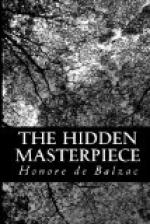“Yes, my dear Porbus,” said Frenhofer, speaking half in reverie, “I have never yet beheld a perfect woman; a body whose outlines were faultless and whose flesh-tints—Ah! where lives she?” he cried, interrupting his own words; “where lives the lost Venus of the ancients, so long sought for, whose scattered beauty we snatch by glimpses? Oh! to see for a moment, a single moment, the divine completed nature,—the ideal,—I would give my all of fortune. Yes; I would search thee out, celestial Beauty! in thy farthest sphere. Like Orpheus, I would go down to hell to win back the life of art—”
“Let us go,” said Porbus to Poussin; “he neither sees nor hears us any longer.”
“Let us go to his atelier,” said the wonder-struck young man.
“Oh! the old dragon has guarded the entrance. His treasure is out of our reach. I have not waited for your wish or urging to attempt an assault on the mystery.”
“Mystery! then there is a mystery?”
“Yes,” answered Porbus. “Frenhofer was the only pupil Mabuse was willing to teach. He became the friend, saviour, father of that unhappy man, and he sacrificed the greater part of his wealth to satisfy the mad passions of his master. In return, Mabuse bequeathed to him the secret of relief, the power of giving life to form,—that flower of nature, our perpetual despair, which Mabuse had seized so well that once, having sold and drunk the value of a flowered damask which he should have worn at the entrance of Charles V., he made his appearance in a paper garment painted to resemble damask. The splendor of the stuff attracted the attention of the emperor, who, wishing to compliment the old drunkard, laid a hand upon his shoulder and discovered the deception. Frenhofer is a man carried away by the passion of his art; he sees above and beyond what other painters see. He has meditated deeply on color and the absolute truth of lines; but by dint of much research, much thought, much study, he has come to doubt the object for which he is searching. In his hours of despair he fancies that drawing does not exist, and that lines can render nothing but geometric figures. That, of course, is not true; because with a black line which has no color we can represent the human form. This proves that our art is made up, like nature, of an infinite number of elements. Drawing gives the skeleton, and color gives the life; but life without the skeleton is a far more incomplete




